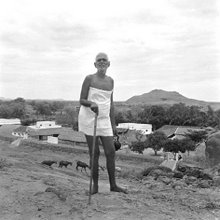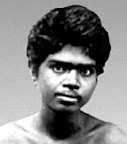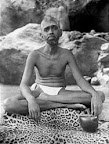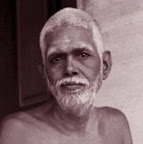BY nature, Venkataraman kept very much to himself and spoke little. Some marked changes occurred in him but neither his family members nor friends could guess what was going on in his mind. He no longer participated in games, nor sought the company of his friends. His visits to the Meenakshi temple were more frequent and he spent most of his time sitting quietly, with his eyes closed in meditation. His former sensitivity and quick reactions got blunted. He, who was formerly intolerant of any offensive remark became indifferent to any jibe. One who protested about any injustice no longer cared about any injustice heaped on him. His former sensitivity gave place to resignation. He no longer had any preferences in the matter of food. He became humble. He continued to attend to household chores but as a matter of routine. He took up his books but his mind was elsewhere. His interest in studies, never great, further slackened.
Such conduct naturally resulted in mild rebukes at first and ended up as punishments. His uncle and brother lamented, "What if he is intelligent, he has always shown very little interest in studies and to make matters worse, he now has these spiritual thoughts which are useless." Venkataraman's brother often made sarcastic remarks to
him and would say, "You sage, why do you have to bother about studies, you may as well go to the forests." Whatever be the goodwill and love of the relatives and however much they might wish for his worldly well-being, how could they approve of renunciation?
Beyond the home, in the external world also, Venkataraman faced opposition. His friends avoided him and sometimes ridiculed him. Venkataraman never retaliated, never responded. Some friends, however, had great regard for him and some feared him. The teachers reprimanded him and punished him.
To add to all these there was that burning sensation in different parts of his body. It left him restless and cooled down only when he sat in meditation. Facing hostility both at home and outside, Venkataraman developed aversion towards the world. His only love was for the Lord's feet. He thought that it would be nice if he were to die, but he had no such `luck.' "When will the Lord show His mercy towards me," he often lamented.
It was Saturday, 29 August 1896 around eleven in the morning. As he did not study his grammar lesson, his teacher punished him asking him to copy a lesson from Bain's grammar text three times. Venkataraman sat in the room upstairs and began carrying out the imposition; with great effort he copied the lesson twice. "Am I a machine to carry out a task without any interest in it?," he asked himself.
The very next moment the writing stopped. He put aside the grammar text, took up a meditative posture and began to meditate.
Nagaswami, his brother, was closely observing all that.
He could not tolerate it and without any premeditation he uttered these harsh, but true, words, "For one who behaves thus, what is the need for all this?"
Such taunts from his brother were not new to Venkataraman but this time they pierced his heart like a speeding arrow. "Yes it is true. I have no interest in studies, my interest lies elsewhere. When I cannot carry out any household responsibilities, why do I need a home at all? What business have I staying here?", thought Venkataraman and decided immediately to leave home for good.
But, what next, where to go or what was the support? In a flash, "Arunachala" danced before his mental eye. About a year ago the Lord's Name throbbed in his heart but disappeared later. It appeared again that day. Once again the same thrill, the same devotion, the same emotional upsurge flooded him. He realized that the Father of the Universe would be his Father, his support and refuge.
Was it another flash in the heart that made him hear these words? Or was his Father beckoning him to come? If the Father were to stretch his arms could the son fail to rush into them? Run he must, to Arunachaleswara's Presence.
Much later Bhagavan himself said that he had left his home to seek refuge in Arunachaleswara and that some powerful, irresistible force brought him over.
"I have discovered a new thing! This hill, the lodestone of lives, arrests the movements of anyone who so much as thinks of it, draws him face to face with it, and fixes him motionless like itself, to feed upon his soul thus ripened. What (a wonder) is this! Oh Souls! Be aware of it and live! Such a destroyer is this magnificent Arunachala, which shines within the Heart!"
Verse 10, Arunachala Padikam
(Eleven Verses to Sri Arunachala)
Referred Resources:
Eleven Verses to Sri Arunachala
Links to letters:
Links to rl:
1896: (Chapter 10: The Great Journey)
1896: (Chapter 6: Rebirth)
Links to sp:
Links to gems:
renunciation: (Chapter 10: Renunciation)





No comments:
Post a Comment